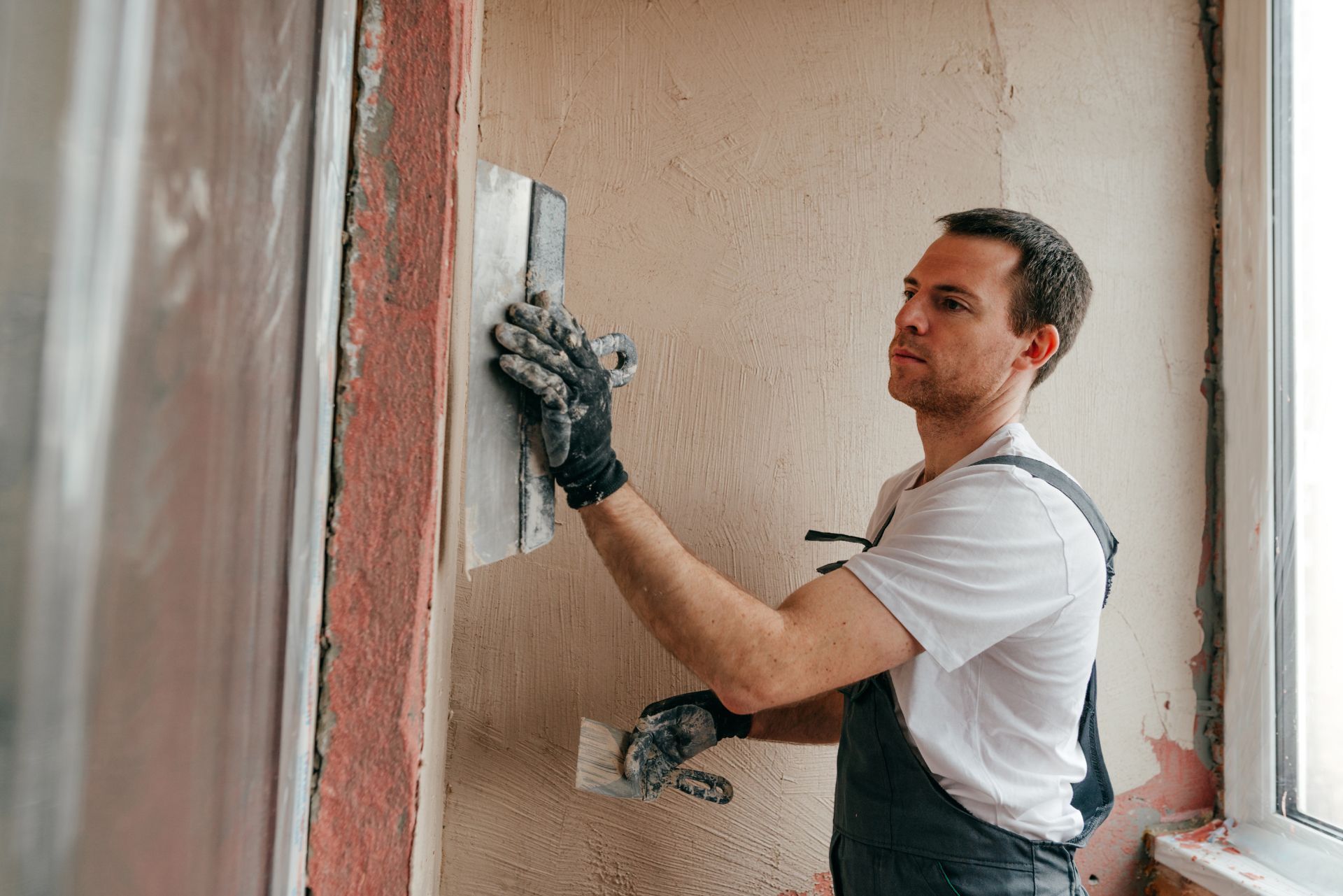
Top 3 Recommended Policies
Stucco and plastering contractors in Connecticut face unique challenges that make insurance not just a formality but a critical safeguard. From navigating state-specific labor laws to managing risks tied to seasonal weather, having the right insurance coverage is essential to protecting your business and reputation. This guide breaks down what Connecticut stucco contractors need to know about insurance, including cost expectations, coverage types, and risk management strategies tailored to this specialized trade.
Understanding Insurance Costs for Stucco Contractors in Connecticut
When budgeting for insurance, stucco contractors should expect general liability insurance premiums to vary significantly based on the scope and scale of their work. According to industry data, general liability insurance quotes for exterior commercial plastering and stucco work typically range from 1.4% to 19.4% of annual revenue. Most contractors, however, pay between 3% and 6% for standard commercial projects.
This range reflects factors such as project size, location, and risk exposure. For example, contractors focusing exclusively on commercial projects under three stories may qualify for premium reductions between 31% and 46% by choosing carriers strategically and ensuring proper job classification. These savings can have a meaningful impact on overall operating costs.
Workers' compensation is another significant expense, with rates for plastering and stucco contractors generally falling between $5 and $7 per $100 of payroll. This coverage protects employees from work-related injuries, which are a real concern given the physically demanding and sometimes hazardous nature of stucco work. The risk of falls, equipment-related injuries, and exposure to harmful materials necessitates comprehensive coverage to safeguard both workers and the contractor's financial stability.
For contractors seeking tailored coverage options, companies specializing in state-specific policies can provide plans designed to meet Connecticut’s regulatory environment and construction conditions. Such specialized offerings help ensure compliance and adequate protection without paying for unnecessary coverage. Additionally, understanding local regulations can aid contractors in navigating the complexities of insurance requirements, potentially leading to further cost savings through compliance discounts.
Furthermore, contractors should also consider the importance of additional coverage options, such as commercial auto insurance and equipment insurance. Commercial auto insurance is essential for those who use vehicles for transporting materials or equipment, while equipment insurance protects valuable tools and machinery from theft or damage. Both types of insurance can significantly impact a contractor's operational efficiency and financial security, especially in a competitive market like Connecticut. By assessing their unique needs and risks, stucco contractors can create a robust insurance portfolio that not only meets regulatory requirements but also supports their business growth.
For more detailed information on pricing and coverage options, ContractorNerd provides valuable insights into insurance costs and strategies for plastering contractors.

Key Insurance Coverages for Connecticut Stucco Contractors
Stucco contractors require a mix of insurance coverages to protect against the range of risks encountered on job sites. The cornerstone is general liability insurance, which covers bodily injury, property damage, and legal defense costs if a third party files a claim related to your work. Given the nature of stucco work, which often involves scaffolding and working at heights, this coverage is indispensable. It not only safeguards the contractor's financial stability but also enhances their credibility with clients, as having proper insurance demonstrates professionalism and a commitment to safety.
Professional liability insurance is also important, especially if contractors offer design or consulting services related to stucco application. This coverage protects against claims of negligence or errors in workmanship that cause financial harm to clients. In an industry where aesthetic appeal and structural integrity are paramount, having this insurance can be a deciding factor for clients when choosing a contractor. It provides peace of mind that, should an unforeseen issue arise, the contractor is prepared to address it financially and professionally.
Tools and equipment insurance safeguards the valuable tools and machinery essential to stucco work. Losses due to theft, damage, or accidents can be costly and disrupt project timelines without this protection. Given the high costs associated with specialized stucco application tools, such as mixers and scaffolding, this insurance can be a lifesaver. Furthermore, it allows contractors to focus on their craft without the constant worry of potential financial loss from equipment mishaps, ensuring that they can maintain productivity and meet client deadlines.
Workers' compensation insurance is mandatory in Connecticut and covers medical expenses and lost wages for employees injured on the job. Given the physical risks associated with plastering and stucco work, this coverage is critical to protect your workforce and comply with state laws. Moreover, fostering a safe work environment not only minimizes the likelihood of accidents but also boosts employee morale and productivity, as workers feel valued and secure in their roles.
For contractors looking for comprehensive packages tailored to the stucco and plastering industry,
Insureon offers specialized coverage options that bundle these essential protections efficiently. These packages can be customized to fit the unique needs of each contractor, ensuring that they are not overpaying for unnecessary coverage while still receiving robust protection against the specific risks they face. Additionally, understanding the nuances of each policy can empower contractors to make informed decisions that align with their business goals and operational realities.
Connecticut-Specific Considerations for Stucco Contractor Insurance
Operating in Connecticut means dealing with particular labor laws, seasonal weather risks, and regulatory requirements that influence insurance needs. Experts at Spectrum Insurance emphasize their understanding of these local factors, which can affect everything from policy terms to risk mitigation strategies.
Winter weather poses a significant challenge for exterior stucco work, increasing the likelihood of accidents and damage. Insurance policies must account for these seasonal risks to ensure continuous protection throughout the year. In addition to snow and ice, the freezing temperatures can cause materials to become brittle, leading to potential failures in stucco applications. Contractors must be vigilant about the timing of their projects and ensure that they are using materials that are specifically designed to withstand the harsh winter conditions typical of Connecticut.
Additionally, Connecticut’s labor laws require strict adherence to workers’ compensation mandates and workplace safety standards. Failure to comply can result in penalties and increased insurance costs. The state also emphasizes the importance of training and certification for workers, which can further influence insurance premiums. By investing in safety training programs, contractors not only protect their workers but can also demonstrate their commitment to safety, potentially lowering their insurance rates.
Contractors should also be aware of consumer alerts issued by the Connecticut Insurance Department, such as the 2020 warning about fraud involving contractors and public insurance adjusters during disaster recovery. Staying informed helps contractors avoid scams that could jeopardize their coverage or reputation. Furthermore, maintaining transparency with clients about insurance coverage can build trust and enhance the contractor's professional image, which is crucial in a competitive market.
Affordable Contractors Insurance provides coverage plans specifically designed for Connecticut’s construction environment, helping contractors maintain compliance and safeguard their projects. Their policies often include tailored options for unique risks associated with stucco work, such as coverage for material defects and liability for environmental damages. Learn more about their offerings at
Affordable Contractors Insurance.
Risk Management and Best Practices for Stucco Contractors
Insurance is only one part of a successful risk management strategy. Stucco contractors must also implement safety protocols and quality workmanship standards to minimize claims and protect their business reputation. Treating client properties with respect and maintaining clear communication can prevent disputes and enhance customer satisfaction.
Stamford Stucco LLC highlights the importance of professionalism on the job, stating they “treat your home with the utmost respect and courtesy, ensuring quality workmanship and stellar customer service.” This approach not only reduces liability but also builds trust and repeat business. By fostering a culture of respect and accountability, contractors can create a positive work environment that encourages employees to adhere to safety protocols and work diligently, ultimately reflecting in the quality of their output.
Proper classification of work and strategic carrier selection can also lower premiums, especially for contractors focusing on specific project types such as commercial buildings under three stories. Regularly reviewing insurance policies and updating coverage to match current operations ensures contractors are neither underinsured nor overpaying. Additionally, engaging in continuous education about emerging risks and industry standards can empower stucco contractors to stay ahead of potential challenges. Workshops, seminars, and online courses can provide valuable insights into the latest materials, techniques, and safety regulations, ensuring that contractors are well-equipped to handle the complexities of their projects.
Moreover, establishing a robust training program for employees is crucial. This program should encompass not only technical skills but also safety practices and customer interaction techniques. By investing in their workforce, stucco contractors can reduce workplace accidents, enhance productivity, and ensure that every team member is aligned with the company's commitment to quality and safety. Furthermore, documenting all training sessions and safety meetings can serve as a valuable resource in the event of a claim, demonstrating a proactive approach to risk management and employee welfare.
Insurance Coverage Comparison for Stucco Contractors
| Coverage Type | What It Covers | Typical Cost Range | Why It Matters |
|---|---|---|---|
| General Liability | Bodily injury, property damage, legal defense | 3% to 6% of annual revenue | Protects against common jobsite accidents and lawsuits |
| Workers' Compensation | Employee injury medical and wage benefits | $5 to $7 per $100 of payroll | Mandatory coverage that safeguards workers and business |
| Professional Liability | Errors, omissions, and negligence claims | Varies by scope of services | Essential for contractors offering design or consulting |
| Tools and Equipment | Theft, damage, or loss of tools and machinery | Depends on equipment value | Prevents costly replacement delays |
Understanding the nuances of insurance coverage is crucial for stucco contractors, as it not only protects their business but also enhances their reputation in the industry. For instance, having comprehensive general liability insurance can significantly improve a contractor's standing with potential clients, as it demonstrates a commitment to professionalism and risk management. Clients are more likely to trust contractors who are adequately insured, viewing it as a safeguard against potential mishaps that may occur during the project. This trust can lead to more contracts and referrals, ultimately boosting the contractor's bottom line.
Moreover, the landscape of insurance is ever-evolving, with new policies and coverage options emerging to address the unique challenges faced by contractors. For example, some insurers now offer specialized coverage for environmental liabilities, which can be particularly relevant for stucco contractors dealing with materials that may have environmental impacts. Staying informed about these developments can provide contractors with a competitive edge, allowing them to tailor their insurance portfolios to better fit their specific operational needs and the expectations of their clients. By investing time in understanding these insurance options, stucco contractors can not only protect their business but also position themselves as leaders in their field.

Frequently Asked Questions
Do I need general liability insurance if I only work on small residential stucco projects?
Yes. Even small projects carry risks of property damage or injury. General liability insurance protects you from financial losses related to these incidents.
How can I reduce my insurance premiums as a stucco contractor?
Focusing on commercial projects under three stories, selecting the right insurance carrier, and ensuring proper job classification can lead to premium reductions of up to 46%.
Is workers' compensation mandatory for stucco contractors in Connecticut?
Yes. Connecticut law requires workers' compensation insurance for businesses with employees to cover workplace injuries.
What should I look for in a stucco contractor insurance policy?
Look for comprehensive coverage including general liability, workers' compensation, professional liability if applicable, and tools and equipment protection tailored to your specific work environment.
Are there risks specific to Connecticut that affect stucco contractor insurance?
Yes. Seasonal weather risks, state labor laws, and potential fraud during disaster recovery are all factors that influence insurance needs in Connecticut.
Can I get insurance coverage that is tailored specifically for Connecticut contractors?
Yes. Some insurers offer state-specific policies designed to meet Connecticut’s regulatory and environmental requirements, helping ensure compliance and adequate protection.
What should I do if I suspect insurance fraud related to my contracting work?
Report any suspicious activity to the Connecticut Insurance Department and avoid working with unverified public insurance adjusters, especially after disasters.
Choosing the right insurance coverage for your Connecticut stucco contracting business is a crucial step toward long-term success. By understanding costs, coverage options, and local risks, contractors can protect their teams, clients, and livelihoods effectively.
Contact Us
Phone
Locations
Connecticut Location
703 Hebron Ave., 3rd Floor, Glastonbury, CT 06033
North Carolina Location
436 East 36th St., Charlotte, NC 28205


